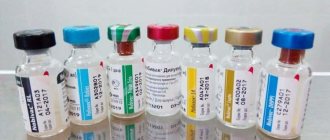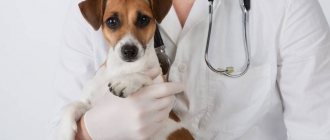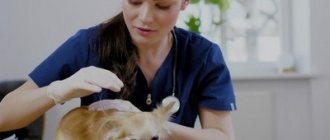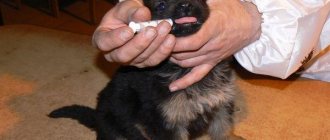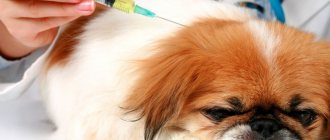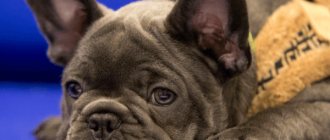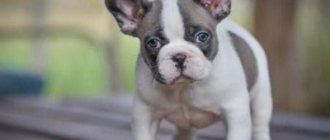The lifespan of dogs in general, and the French bulldog in particular, largely depends on good health. Therefore, the owner must have knowledge of how he can protect his pet from illnesses and various infectious diseases.
One of these mandatory measures is vaccination. Vaccinations are a mandatory procedure that will help avoid many undesirable consequences, including death. In addition, some veterinary clinics may not accept an adult dog for treatment without vaccination. Not to mention the fact that the dog will be refused mating, will not be allowed to enter the exhibition and will not be allowed to fly abroad.
Types of vaccines and diseases
Thanks to the achievements of modern medicine, protection against especially dangerous diseases in the form of vaccinations has now been developed. These vaccines come in 2 types. The so-called monovaccines are for one type of disease and polyvalent, i.e. complex. The owner usually chooses which one to prefer. However, it is still necessary to listen to the opinion of the veterinarian who is caring for the dog. Preference is mainly given to polyvalent ones. This will save the dog from unnecessary worries, and you won’t have to go to the veterinary clinic again.
There is also a third type of serum, the so-called hyperimmune. This vaccination is given only to adult and unvaccinated animals when the dog needs surgery, usually a couple of hours before the start. This is mainly done in areas with a difficult epidemiological situation. All drugs contain viruses that are completely or partially killed. After their use, the body begins to produce certain antibodies.
As a result, the dog suffers a mild form of the disease and at the same time develops immunity from the introduced pathogen. The protective mechanisms that the body has developed immediately destroy the invading infection. In extreme cases, there may be pathology, but it will proceed easily. Sad statistics show that in 90% of cases, unvaccinated animals die when infected.
Mandatory vaccinations against the following diseases:
- Rabies. Installed annually. It is well tolerated and has a high mortality rate if neglected.
- Parvovirus enteritis. It belongs to the category of intestinal diseases, leading to dehydration and immediate death.
- Plagues of carnivores. A painful disease, difficult to tolerate, leading to death in 90% of cases. Prevention only through vaccination.
- Adenovirus : belongs to the category of pulmonary infections. Predisposition manifests itself most often in puppies with reduced immunity. To prevent it, annual vaccination is necessary, because even an adult pet that has recovered from the disease will not have long-lasting or stable immunity.
- Infectious hepatitis is a viral disease that affects the central nervous system and such an important organ as the liver.
Additional serums for dogs, at the request of the owner, against the following diseases:
- Parainfluenza : this viral disease has a pronounced seasonality. It is transmitted by airborne droplets and is highly pathogenic. They are vaccinated against it, as a rule, before the outbreak of epidemics. To do this, you must first consult a veterinarian and find out when such a period usually begins.
- Leptospirosis. An infectious disease transmitted by rodents.
- Piroplasmosis.
- Coronavirus.
- Giardiasis.
- Lyme disease.
It is also highly recommended to get a vaccine against leptospirosis and parainfluenza. They are contagious to humans and very poorly tolerated.
French bulldog first vaccinations
› Vaccinations
articles Loading…
Taking care of your puppy's health these days is unimaginable without vaccination.
French bulldogs are not known for their good health, especially at an early age, so the issue of vaccinations is the primary concern of the owners of these cute creatures.
By adhering to the rules of vaccination, the owner will not only improve the health of his pet, but will also ensure his safety during this period.
Types of vaccines and diseases
There are many known diseases that French bulldogs can suffer from, and many of them can be fatal . Thanks to the achievements of veterinary medicine, protection in the form of vaccinations has been developed against some diseases that are especially dangerous for dogs. Vaccines can be for one type of disease - mono-vaccines or for several - complex vaccines (polyvalent).
The decision on choosing vaccines for a pet is made by the owners themselves, but the opinion of the veterinarian caring for the dog should also be taken into account. Now many are trying to use complex vaccines to avoid unnecessary manipulations and stress on the animal.
- The rabies vaccine is given once a year and is well tolerated by puppies and adults. The danger of this disease is the high mortality rate in case of infection and the possibility of its transmission to humans.
- Canine distemper is a serious disease that brings suffering to dogs and also has a high risk of death for the animal. Vaccination usually takes place without complications, but sometimes it causes a slight malaise in puppies, which goes away within 2-3 days.
- Parvovirus enteritis is an intestinal disease, the danger of which is complete dehydration of the animal’s body, resulting in death. This disease can be prevented by vaccination.
- Leptospirosis is an infectious disease that can be prevented by preventive methods in the form of vaccination. Carried by rodents. Dogs after the age of 4 months are vaccinated once a year. Puppies up to six months old are revaccinated after 6 months.
- Infectious hepatitis is viral in nature and affects the liver and central nervous system.
- Adenovirus is a pulmonary infection that most often affects young animals (puppies) with reduced immunity. Annual vaccination will help to avoid problems with this disease, since even a dog that has recovered from the disease has an unstable and short-lived immunity.
- Parainfluenza is a viral disease transmitted by airborne droplets, has a high pathogenicity and pronounced seasonality. Therefore, you should be vaccinated against parainfluenza before the start of the epidemic period; information about this can be clarified from veterinary specialists.
When to start vaccination
From the moment of birth, French bulldog puppies are still protected by the immune bodies of his mother, passed on to him through milk and through the placenta. They act in the first few weeks of his life. However, by the age of one and a half months, puppies begin to form their own immunity, and the immunity received from the mother begins to fade.
During this period, the puppy is most vulnerable to viruses and other infections. Vaccines can come to his aid. But before immunization and for some time after, a quarantine regime should be observed, which excludes walks, communication with other animals not included in the litter, and contact with sick or recovering individuals.
Puppy vaccination schedule
Nowadays the following vaccination scheme for French bulldogs is often used:
- 6 weeks - vaccination against enteritis, hepatitis, adenovirosis, after 2 weeks - repeated vaccination, subsequently - after a year - every year;
- 10 weeks - anti-plague vaccination;
- after 16 weeks - vaccination against leptospirosis, after six months - revaccination;
- 7 months - revaccination against plague, then after a year - every year;
- after 8 months - rabies vaccine.
In adulthood (upon reaching one year), the dog is vaccinated once a year with the necessary vaccines (according to the epidemiological situation) according to the recommendations of a specialist veterinarian.
You should also take into account the recommendations of vaccine manufacturers about the timing of revaccination, which they indicate in the annotations to the drug and the opinion of the specialist leading the dog, and also keep in mind that revaccination should be carried out with the same vaccine and from the same manufacturer as the first.
Important! It must be remembered that information about the composition of the vaccinations given, their names and the dates of the manipulations performed must be reflected in the dog’s passport.
Preparing a French Bulldog for vaccination
Following the recommendations for preparing a pet for vaccination will help not only alleviate the pet’s condition, but also save the owner’s nerves: forewarned is forearmed.
It is necessary to decide who will vaccinate the puppy: perhaps the breeder will carry out revaccination on his territory with his own vaccine, or perhaps you need to contact a veterinarian, having previously specified the date of your visit and the availability of the necessary vaccination material.
So, 2 weeks before the proposed vaccination, it is necessary to observe the puppy: assess its general condition, appetite, sleep, stool, measure its temperature several times in order to assess its condition after vaccination.
Therefore, if helminths are detected in the puppy’s feces, it makes sense to consult with a veterinarian about further actions.
You should remember all known cases of allergic reactions in your pet in order to report them to the specialist before administering the vaccination. During this period, it is better not to walk puppies up to a year; in extreme cases, going out into the fresh air is possible, but in the hands of the owner, going down to the ground is excluded.
On the day of vaccination, the puppy should have a healthy appearance, good appetite, no temperature higher than normal, no constipation (it is better if the intestines are emptied). Immediately before vaccination, it is not recommended to feed the puppy, but he should not feel thirsty.
Possible complications and consequences
After vaccination, you should follow the quarantine regime: refrain from walking, do not tire the dog, provide adequate feeding, do not force him to eat if there is no appetite, ensure constant availability of water, do not overcool, do not bathe. Quarantine regimes for different vaccinations are different:
- from enteritis, hepatitis, rabies, leptospirosis - 2 weeks;
- from plague - 3 weeks.
Some puppies may have reactions to vaccines given to them.
If within three days after the vaccination the puppy is lethargic, has a depressed appetite, and his temperature rises, this may be a reaction of his body to the introduced strain of the disease, about which the veterinarian or other specialist who administered the vaccination should notify the owner. During this period, the dog should not be disturbed or forced to eat, but thirst must be excluded.
If the temperature rises significantly, dehydration occurs, and if the above symptoms last more than 3 days, you must urgently seek help from a specialist.
If a lump forms at the injection site, you should monitor it and if it does not resolve within a few days or, on the contrary, increases, you should consult a doctor.
If after vaccination the puppy is constantly sleepy, experiences shortness of breath, salivates profusely, or has a bluish appearance on the skin - this indicates an allergic reaction - you cannot do without the help of doctors.
When to avoid vaccinations
It is better to reschedule vaccination in cases where:
- the puppy is lethargic, refuses to eat or drink, or vice versa, is hyperactive, overexcited;
- the dog is unhealthy, has a fever, itching, redness, etc.;
- the day before, the dog had contact with a sick dog, since vaccinating a puppy infected with an infection that is in a latent form in its body carries the risk that the vaccine can aggravate the disease, even leading to the death of the animal;
- the pet has not completed the deworming course;
- the puppy's teeth are changing;
- less than 3 weeks have passed since the previous vaccination (not counting cases of revaccination);
- the owner sees other warning signs that may worsen the puppy’s condition.
In all these cases, it is necessary to seek help from a doctor, preferably calling him at home and, after receiving the necessary consultation, decide to postpone the vaccination date to another day.
Bulldog Maniacs Forum – English Bulldog Filya
All about the English Bulldog breed
Price
It differs depending on the type of serum and the manufacturer. It is also necessary to take into account the cost of doctor's services. So, for example, domestic drugs cost about 300–400 rubles, while imported ones are already more expensive and cost 600–800 rubles. Veterinarian services average 200 - 600 rubles. As a result, it turns out that one vaccination will cost 1000 - 1500 rubles. But in any case, you should not save on the health and life of your pet.
When should I start doing it for puppies?
After birth, French bulldog puppies are protected for several weeks by antibodies transmitted through mother's milk, which gradually fade away, and starting from the 8th week, they stop working completely. Then he begins to develop his own immunity. But there is an exception to the rule. For example, it is recommended to give serum to one-month and one-and-a-half-month-old puppies if they are artificially fed or will be transported to another place.
It may also be that there is an epidemiological problem in the nursery. This is usually done with drugs from the Puppy series. At this time, before vaccination, the dog is most vulnerable. Therefore, she needs to be kept in quarantine, not allowed to come into contact with other animals not from her litter, and not allowed to go for walks.
Vaccinations for a French bulldog – when to do them, which ones
Vaccinations for a French bulldog are a mandatory medical procedure. They will protect the dog and its owners from fatal infections - after all, viruses are transmitted to humans. In addition, an unvaccinated dog will not be allowed into exhibitions, abroad, will be refused mating, and some veterinarians will not accept adult unvaccinated animals.
The article describes what a French bulldog is vaccinated against, describes the vaccination schedule, and caring for the pet before and after the procedure.
Why and against what are French bulldogs vaccinated?
Vaccination preparations contain partially or completely killed viral cells – the so-called. "live" and "dead" vaccines. After their administration, antibodies against infectious diseases begin to be produced. Simply put, a pet is infected with a weakened virus, the dog suffers a mild form of the disease and develops immunity to certain pathogens.
The risk of infection remains even after vaccination. However, protective mechanisms destroy the infection immediately after entering the body, or the pathology proceeds easily. Whereas unvaccinated animals die in 90% of cases.
Dogs must be vaccinated against:
- Rabies. Dangerous viral disease. If the dog is not vaccinated, the infection will lead to death in 100% of cases.
- Plagues of carnivores. The infection has several forms and is difficult for animals to tolerate – deaths occur in 90% of pets.
- Parvovirus enteritis. The virus attacks the intestines, leading to dehydration and death.
- Adenovirus. A pulmonary infection, more common in puppies with low immunity.
- Infectious hepatitis. Disturbs the functioning of the liver and central nervous system.
These serums must be administered.
Depending on the epidemiological situation in the area and the wishes of the owner, additional vaccinations are recommended against:
- coronavirus;
- piroplasmosis;
- Lyme disease;
- giardiasis;
- dermatomycosis;
- parainfluenza;
- leptospirosis.
It is highly advisable to get vaccinated against parainfluenza and leptospirosis. Viruses are contagious, transmitted to humans, and are difficult to transmit.
Another type of sera for vaccinations is hyperimmune. They are administered to unvaccinated animals when it is necessary to develop immunity a couple of hours before surgery, in regions with a difficult epidemiological situation. But such drugs are given only to adult dogs, and they last for 2–3 weeks.
The first vaccination is given to French bulldog puppies at 2 months. Until this age, it is protected by innate immunity - the mother's antibodies, which come with milk.
There are exceptions to the age at which the first serum should be given to puppies. Sometimes they are vaccinated at 1 - 1.5 months - with special preparations from the Puppy series. Early vaccination is recommended if babies are artificially fed, they will be transported, there is a dangerous epidemiological situation in the nursery.
The standard vaccination schedule looks like this:
- at 8 weeks – the first vaccination is given against distemper, hepatitis, enteritis, parainfluenza, leptospirosis, boreliosis;
- at 11 weeks - revaccination against the same viruses;
- at 3 or 6 months (at the owner’s request) - rabies injections are given;
- at 6 or 7 months - when the teeth are replaced: repeated vaccination against all infections except rabies;
- at 12 months another serum is given;
- adult dogs are vaccinated annually - after a while the protection weakens and the drug needs to be re-administered.
Information about each vaccination is indicated in the veterinary passport: a label from the drug is pasted in, the date is indicated, the doctor’s signature and the clinic’s seal are affixed.
The vaccination schedule is indicative. An individual schedule for vaccinations is developed for each dog. It is advisable to adjust it for summer and winter - viruses are less active during the “dry” seasons.
Preparation rules
Improper vaccination is useless or dangerous: it can lead to complications and death. Therefore, the French bulldog is prepared for the procedure 2 weeks in advance:
- they give a drug for helminths - “Kanikvantel”, “Drontal”, “Milbemax”, etc.
; - treated against fleas, ticks, lice - “Stronghold”, “Frontile”, etc.;
- measure temperature - normal for dogs is 38 - 39°C;
- Avoid hypothermia, drafts, intense walks, and stress.
You cannot vaccinate:
- weak and sick pets;
- bitches 3 months before mating;
- 2 weeks before and after estrus, childbirth, taking antibiotics or surgery;
- during the change of milk teeth to permanent ones - some drugs change the color of the enamel, it will remain yellow or gray forever;
- if you suspect that your French Bulldog is already infected.
What to do after vaccinations
The first 2 - 3 weeks after vaccination, French bulldogs are weakened.
Their body is fighting the virus, so it’s worth protecting your pet from:
- long walks;
- heavy physical and mental stress;
- poor or excessive diet;
- drafts, hypothermia, overheating, dehydration;
- bathing;
- communication with unvaccinated animals.
After the first and second vaccinations of a French bulldog puppy, he is kept in quarantine. The baby is not taken outside and is not allowed to have contact with other pets - except for parents, brothers and sisters. This is a period of immune gap - maternal antibodies are no longer effective, and their own defense mechanisms have not yet been formed.
Since vaccination is a deliberate infection of the virus, the French Bulldog will experience illness. There may be an increase in temperature to 39.5°C, weakness, decreased appetite, single vomiting or diarrhea, and swelling at the injection site. This is fine.
You need to be wary if your dog has:
- temperature above 40°C;
- repeated vomiting, diarrhea;
- no appetite for more than 1 day;
- hypersalivation - excessive salivation;
- convulsions;
- labored breathing;
- discharge from the eyes and nose.
These symptoms indicate complications. It is necessary to immediately contact a veterinarian.
Another dangerous consequence is an allergy to the drug. It will manifest itself in the first half hour: itching, redness and rash at the injection site, cyanosis of the mucous membranes, shortness of breath. An antihistamine should be administered immediately. Otherwise, your French Bulldog will go into anaphylactic shock and die. For this reason, after vaccinations, they remain in the clinic for 20–30 minutes under the supervision of a doctor.
Schedule
The schedule is indicative and is compiled individually for each dog. It must be agreed upon with the specialist who is leading the dog.
- Starting from the eighth week, the first vaccine is given against hepatitis, parainfluenza, enteritis, canine distemper, and leptospirosis.
- Ten to eleven weeks: repeat (re-vaccination) of these drugs. Then it is held every year.
- At three or 6 months, if desired - for rabies.
- After changing teeth, usually at six to seven months, again from all diseases, excluding the rabies vaccine.
- At twelve, everything is done again. Then it is done annually.
All information about the vaccines supplied must be indicated in the veterinary passport. It is necessary to indicate the date, the doctor's name, and the presence of a seal.
Here it is necessary to take into account the fact that revaccination should be carried out with the same vaccine and from the same manufacturer as the first. Also, you should adhere to the terms of revaccination in the annotations for the drugs.
Preparation
It is necessary to follow a number of recommendations that will help your French Bulldog puppy undergo vaccination less painfully and avoid unwanted complications. If earlier, when purchasing a puppy, it was not specified who is doing the revaccination, the breeder or the buyer, then you should contact a veterinarian. You need to make an appointment in advance and check the availability of medications in the clinic, which are indicated in the veterinary card.
- Two weeks before the procedure, you should pay attention to the general condition of the animal. Observe his appetite, bowel movements and sleep.
- It is necessary to measure the temperature several times in order to compare these readings after vaccination. For a puppy, the normal temperature is 38 – 39 °C, for an adult dog 38.5 – 39 °C.
- Do deworming against parasites in 10-14 days. Suitable drugs: Milbemax, Drontal, Kanikvantel and others.
- Treat against ticks and fleas. Medicines: “Stronghold”, “Frontile” and others.
- Avoid walking your puppy outdoors until he is one year old. As a last resort, only in the arms of the owner.
- Protect from stress, drafts and hypothermia.
- Tell your veterinarian if you have any allergies.
- On the day of vaccinations, the puppy should have a normal healthy appearance.
- It is not recommended to feed your dog before the procedure. Drinking water is not prohibited.
Vaccination of French bulldogs: how to save a dog from premature death?
French bulldogs are a small decorative breed that cannot always boast of strong immunity.
During street walks, your pet will inevitably encounter other animals that can be carriers of dangerous infections.
To protect your dog from diseases, it needs to be vaccinated. To do this, you need to know the vaccination schedule for French bulldog puppies, how to prepare him for this procedure and what complications there may be.
When do they start vaccinating?
The first two months of life, the baby is protected from dangerous infections thanks to the antibodies that he receives from colostrum and mother's milk. Therefore, a French Bulldog puppy's first vaccination is usually given at 8 weeks of age.
In some cases, exceptions are possible. For example, if the epidemiological situation in a given area is difficult, the puppy can be vaccinated from the age of one month. But special vaccines are used for this.
It is important! If the puppy has a weak immune system, he is given a dead vaccine. This means that it contains a killed virus. It contributes to the development of immunity to the disease, but not very strong and long-lasting.
What diseases are they vaccinated against?
Vaccinations against the following diseases are mandatory:
- Rabies. An extremely contagious disease for animals and people, which in most cases leads to the death of the infected person.
- Enteritis. This is an intestinal infection that leads to rapid dehydration and death.
- Plague. There is practically no cure. The mortality rate from this disease is 90%.
- Hepatitis. Leads to pathological changes in the liver and damage to the central nervous system.
- Adenovirus. Respiratory tract infection occurs. Puppies with reduced immunity are most susceptible. But adult animals are also at risk.
Whether you should be vaccinated against the following diseases depends on the epidemiological situation in the area:
- Parainfluenza. Transmitted by airborne droplets. Its outbreaks are seasonal. The French bulldog is vaccinated before cold weather or during an epidemic.
- Lyme disease. An infection that is transmitted through the bites of flies and ticks.
- Leptospirosis. Carried by rodents, dangerous to humans.
- Giardiasis. A disease that occurs as a result of infection by parasites.
- Piroplasmosis. A seasonal disease transmitted by ticks.
French bulldog vaccination schedule and scheme
There are two types of vaccinations:
- Monovaccine. Contains the causative agent of one disease.
- Polyvaccine. Contains 2 or more pathogens.
The first type of vaccine for a French bulldog is more gentle, because the body will have to fight only one disease. However, vaccination will take a long time, and the puppy will have to be taken to see a doctor more often. Therefore, veterinarians prefer to vaccinate with polyvaccines.
The first vaccination is given to the puppy at the age of 6-8 weeks. Weakened pathogens of the following diseases are introduced into the body: enteritis, hepatitis, plague, leptospirosis, parainfluenza.
After 4 weeks, revaccination against the same diseases is given.
A French Bulldog is vaccinated against rabies when it has a complete change of teeth. Usually this is 6-8 months.
! Dogs are not vaccinated when they change their teeth, because this causes the enamel to turn yellow.
Preparing for the injection
The first vaccination is usually given by the breeder. Some owners vaccinate their pets themselves. This is quite risky, because one small mistake can lead to your pet becoming infected with a deadly disease. Therefore, it is better to contact a professional to vaccinate your French Bulldog.
2 weeks before vaccination, your French Bulldog puppy should start taking his temperature in the morning and evening. Normally, it can fluctuate around 37.5-39 degrees.
During vaccination, a weakened virus enters the animal’s body. If a dog's immune system is weakened, it may get sick. This is why it is important to get rid of all parasites.
10 days before vaccination, you need to do a preventative cleaning of helminths, and also rid your French bulldog of fleas.
It is important! Before vaccination, the owner has the right to check the expiration date and quality of the vaccine. It should be stored in the refrigerator. There should be no flakes floating or sediment in the ampoule.
What you should pay attention to
Signs that indicate that it is better to postpone vaccination of your French Bulldog:
- Increased body temperature.
- Redness and inflammation on the skin and mucous membranes.
- Digestive disorder.
- Recent contact with an infected animal. In this case, an injection with a weakened pathogen can lead to illness.
- Pregnant and lactating females should not be vaccinated.
Care after vaccination
During this period, your pet needs to be especially protected, because any malfunction in the body will lead to illness.
Features of caring for a puppy after vaccination:
- The pet cannot be bathed.
- The dog should not be overcooled.
- The French Bulldog should not be taken outside until 10 days have passed since the second vaccination.
- It is necessary to exclude contacts with unvaccinated animals.
- The diet should be complete and balanced.
- Strong physical activity is prohibited.
- Stress is contraindicated. The pet should be calm and happy.
How you feel after vaccination
Since the French Bulldog's body fights the introduced viruses, the puppy may feel worse for the first time after vaccination.
Within a few days he may experience the following symptoms:
- increase in body temperature to 39.5 degrees;
- decreased activity and apathy;
- slight diarrhea;
- vomit;
- slight swelling and redness in the injection area.
These symptoms are completely normal. They should disappear within 3 days.
Possible complications
You should not take your French Bulldog from the hospital immediately after the injection. The puppy should be under the supervision of a doctor for half an hour. Rapid and difficult breathing, rash and redness, swelling along with the injection indicate the occurrence of an allergic reaction.
In this case, the pet urgently needs to be given antihistamines.
If the following symptoms appear, you should immediately consult a doctor:
- labored breathing;
- convulsions;
- lack of coordination;
- incessant vomiting;
- body temperature above 40 degrees;
- severe diarrhea;
- complete refusal to eat.
What vitamins and mineral supplements should you give your bulldog?
Not only vaccinations help improve the French Bulldog's immunity. The dog's diet should be balanced and contain vitamins and minerals. Often, premium and super-premium dry food already includes all the necessary elements.
If your French Bulldog eats natural food, you should include vitamin and mineral supplements in its diet. The same applies to puppies, pregnant and lactating females, dogs with weakened immune systems.
It is important! The amount and type of vitamin must be determined by a veterinarian individually for each animal, depending on its age, health status, weight and other factors.
Key vitamins that should be included in a French Bulldog's diet:
- Vitamin D is especially important for puppies, as it affects the formation of bone tissue. If it is deficient, the dog may develop rickets.
- Vitamin A affects growth, vision, central nervous system and reproductive functions.
- Vitamin B3 affects the condition of the coat and skin.
- Vitamin B6 affects the formation of hemoglobin and blood quality.
- Vitamin E affects reproductive function.
The following minerals should also be present in the French Bulldog's diet:
- copper;
- sulfur;
- phosphorus;
- potassium;
- sodium;
- calcium;
- iron;
- iodine.
Thus, in order to protect your French Bulldog from deadly diseases, he needs to get all the required vaccinations.
To schedule a vaccination, you need to contact your veterinarian. Notes on all vaccinations given must appear in the animal’s passport.
Vitamin and mineral supplements will also help strengthen your immune system and increase your body's defenses against disease.
Source: https://litbro.ru/porody-sobak/frantsuzskij-buldog/vaktsinatsiya-frantsuzskih-buldogov
Need to abstain
It is necessary to refuse the procedure and reschedule vaccinations for another time in the following cases:
- If there is a suspicion that the French bulldog had contact with an infected dog and became infected himself. This is fraught with the fact that the vaccine can only intensify the disease and lead to very sad consequences. Up to and including death.
- No parasite treatment has been carried out.
- If the puppy is lethargic or, on the contrary, too active and excited. Or sick.
- There is a change of teeth.
- Less than three weeks have passed since the previous vaccine. The exception is revaccination.
- Bitches, less than three months before mating.
- Less than two weeks before and after surgery, childbirth or estrus, antibiotic administration.
- If there are any other suspicions that impair health.
Raising a 2 month old French Bulldog puppy
At 2 months old, your French bulldog puppy is still at home, in quarantine after the first vaccinations, and he is not yet allowed to go for walks. Therefore, it’s time to start raising a puppy in familiar home conditions.
The first step is teaching the puppy to go to the toilet in a diaper . At the same time, it should be remembered that any learning is a rather complex thing, and when you see the first positive results, you should not think that your puppy has already understood everything, but you should continue training according to the method, so that after a while you do not have to start all over again.
The second important point will be to accustom the puppy to a collar and leash . Yes, yes, this should be done at home, so that by the time the puppy goes outside for the first time, wearing a collar will not be additional stress for him, but is already a familiar thing, and he can begin to explore the world around him, rather than trying get rid of an unknown object.
The third point, which causes the greatest difficulties for new puppy owners, will be the definition of the puppy’s boundaries of what is permitted :
- Teach to play only with your toys, and not with your things;
- Explain that you cannot bite your hands even in a game;
- Establish the correct daily routine, establishing the rule that in the morning you need to sleep and not wake you up;
- Stop chewing furniture, clothes, walls and baseboards;
- Teach to stay home alone, knowing that your absence is not a reason to bark or howl.
IT IS EXTREMELY IMPORTANT TO KNOW: that constant and excessive punishment following almost every action of the puppy has a detrimental effect on its fragile psyche and can lead to the fact that the French bulldog puppy will grow up cowardly and embittered. For normal natural development, a puppy must have the opportunity to explore the world around him, which is currently limited to your apartment or house.
You should also begin now to familiarize yourself with the initial obedience commands in a light playful form, while focusing on rewards for execution, because the puppy’s psyche is still quite plastic and excessive severity and exactingness can lead to the puppy being intimidated and cowardly. Therefore, it is necessary, first of all, to try to interest the puppy by offering him a toy or treat, and sometimes just praise.
Possible complications and consequences
Vaccination involves the introduction of a virus, so the French bulldog will experience general malaise for approximately three days. Reactions such as: decreased or lack of appetite, general weakness, fever up to 39.5 ° C, occasional vomiting or diarrhea are possible. A lump-like swelling may also appear at the injection site. All these manifestations are of a normal response nature. During this period, it is better not to disturb the dog again and protect it from the following actions:
- Long walks and heavy loads.
- Bathing.
- Hypothermia or overheating.
- Communication with animals that are not vaccinated.
It may also be that excessive salivation, redness on the skin, itching, shortness of breath appear - all this is a manifestation of a reaction to an allergy. This usually occurs within half an hour after the vaccine is administered. If an antihistamine is not administered at this time, anaphylactic shock may occur, with the most dire consequences, including death. It is for this reason that you need to stay with the doctor for half an hour and see what the reaction is.
You should immediately consult a doctor in the following cases:
- For convulsions.
- Repeated discharge in the form of diarrhea or vomiting.
- If you have heavy and difficult breathing.
- Profuse salivation.
- Temperature 40 °C or more.
- Lack of appetite for more than a day.
How you feel after vaccination
Since the French Bulldog's body fights the introduced viruses, the puppy may feel worse for the first time after vaccination.
Within a few days he may experience the following symptoms:
These symptoms are completely normal. They should disappear within 3 days.
